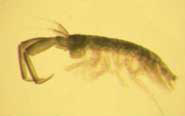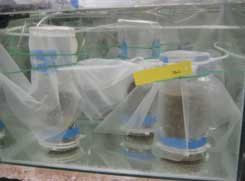by Cefas, UK
A recent report by Cefas scientists found that ocean acidification, caused by climate change, could result in sediments contaminated with metals becoming more toxic and harming the animals that graze on that sediment.
The study looked at crustaceans that feed on the surface of sediments from dredged ports and estuaries.
The crustacean Corophium voluptator

“The combined effect on these animals, of coping with adapting to climate change as well as increased toxin levels, could prove to be fatal,” said Dave Sheahan, a senior Cefas researcher on the study.
Cefas already monitors dredged sediments from industrialised estuaries for poisonous metals. Such areas are regularly dredged to maintain harbour entrances, and the excess material is tested for toxicity.
In the laboratory, burrowing crustaceans that normally graze on the surface of sediment were placed in a tank with dredged material from one of these sites. The creatures were then exposed to current sea conditions as well as acid levels predicted for the next 50 and 100 years. The animals that survived ten days in these tanks were then tested to see if they incurred DNA damage.
Incubated sediment corers during the experiment

The animals experienced significant DNA damage, which rose with acidification levels, suggesting that when acidification is combined with metals in sediments it can be more harmful. The study also showed, however, that as the toxicity of ingested metals rises, animals are sometimes able to adapt their behaviour to cope with such changes.
Dr Silvana Birchenough, senior benthic ecologist and co-author of the study, described how “initially you can see the distinct burrows they made, but after treatment there was less activity: some species just sat on top without moving much. This showed us how some organisms may be able to move more or less to regulate for these changes. So there could be a trade-off in behaviour.”
The scientists may now find that certain species’ are less tolerant, or even some genotypes within species are better able to tolerate changes. So, over time, species that cope less well may face stiffer competition from groups of animals that are more adaptable.
Cefas will continue to work in this area, focusing on commercially important crustaceans like lobsters and crabs. They will be assessed to see if those creatures are also exposed to contaminated sediments.
Birchenough continued: “There’s a commercial importance on where we think the major exposure routes are. In our study we focused on two aspects: whether contaminated sediments and changes in ocean acidification will affect animals in the marine environment, and whether the tests we do will help us to make a judgement about sediments that we currently deem okay.”
Currently, if toxicity in dredged sediments falls below a predetermined threshold they are considered safe to deposit in the sea. However, rising ocean acid levels may put more stress on animals, on top of the metal toxicity, meaning that current threshold values would need to be changed to make sure all marine animals, including crustaceans, are protected.
Fact File
- Laboratory tests on the amphipod, Corophium volutator, were conducted to determine whether it would respond to the combined effects of increasing CO2levels and metals.
- Amphipods were exposed to two test sediments – one with relatively high metals concentrations and control sediment with lower contamination – under conditions that mimic current and projected ocean acidification conditions (390-1140 atm p CO2).
- The data demonstrated the clear potential for near-future acidification to increase the susceptibility of benthic ecosystems to contaminants.
- Paper: Roberts, D A, Birchenough, S N R, Lewis, C, Sanders, M B, Bolam, T and Sheahan, D (2013), Ocean acidification increases the toxicity of contaminated sediments. Global Change Biology, 19: 340-351 (http://onlinelibrary.wiley.com/doi/10.1111/gcb.12048/abstract).
Links
- Cefas’ Marine Climate Change Centre (MC3): http://www.cefas.defra.gov.uk/our-science/marine-climate-change-centre-(mc3).aspx
- Ocean acidification experimental facility: http://www.cefas.defra.gov.uk/our-science/marine-climate-change-centre-(mc3)/climate-change-impacts/ocean-acidification-experimental-facility.aspx
- Dredged marine sediments: http://www.cefas.defra.gov.uk/our-science/assessing-human-impacts/dredged-marine-sediments.aspx
